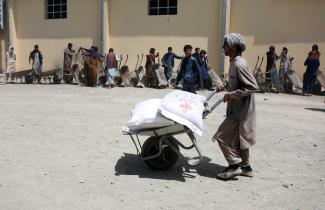Economic meltdown
Enable Afghans to rebuild rudimentary economy

A little more than a year has passed since the Taliban took Kabul in August 2021. The event made headlines and caused soul-searching among western policymakers, but quickly faded from public attention internationally.
Nonetheless, the USA and its allies still bear a large responsibility for the fate of Afghanistan’s people. The USA is the dominant world power. It played a decisive role in bringing about the current crisis. Its engagement in Afghanistan long predates 2001, when US troops invaded the country after the Al-Qaeda attacks on New York and Washington. Afterwards, the attempt to build a democratic state was supported by NATO and the international community, but failed spectacularly (see Paul Miller on www.dandc.eu). Many of Afghanistan’s current woes originate in these two decades.
Now the Taliban are back in power. Afghans face momentous and almost entirely negative changes. Repression is harsh, though not as brutal as it was under the Taliban’s previous rule. What matters more, however, is the economic meltdown triggered by western troops’ infamous withdrawal last year.
Poverty is worsening fast
Poverty is worsening fast. Some 24 million people need humanitarian aid, experts reckon. Unemployment has increased dramatically. Afghans of every social class have lost jobs and income. Even formerly prosperous people struggle to make ends meet.
The Taliban have never shown much interest in economic policymaking, but that is not what caused this crisis. The underlying problem is that after 2001, the economy had become entirely dependent on foreign funding, and that flow of money suddenly stopped. International partners had funded:
- Afghanistan’s government agency, from national to local levels,
- the security forces,
- civil-society organisations and
- even some private-sector companies.
Moreover, international development agencies had invested in major projects. All summed up, the entire economy was driven by transfers from abroad.
Making matters worse, the influx of foreign money drove up the exchange rate of Afghanistan’s currency, making export industries uncompetitive internationally. The big exception was the illegal drugs economy.
Without foreign funding, Afghanistan suddenly lacked the means to import goods of vital relevance, including food. Adding to the pain, the USA effectively began to sanction the Central Bank of Afghanistan, withholding $ 9 billion which the Afghan state had kept in American bank accounts.
The Taliban’s response to the broad-based suffering is inadequate. They have initiated some food-for-work programmes, but their government is basically begging for foreign assistance. Those appeals are largely falling on deaf ears because most governments shy away from engaging with them, fearing that such steps might be considered legitimising the new regime. International non-governmental organisations (INGOs) are staying away as well. The regime is isolated, not least due to US sanctions.
Afghans need much more than a bare minimum of food
UN agencies are providing some emergency aid. A major famine has so far been averted. Afghans, however, need much more than a bare minimum of food. It is deeply disturbing that neither the UN, nor the USA and its allies have even a mid-term strategy for how to deal with Afghanistan.
Thanks to the failed western attempt at nation-building, Afghanistan’s economy became dependent on foreign money. While there is no quick way out, to prevent a humanitarian disaster, some level of financial interaction with Afghanistan is necessary. Attempts to financially starve the new regime will most likely result in people actually starving. The goal should be to enable Afghans to rebuild a rudimentary economy, without officially recognising the Taliban regime.
Three sensible options are:
- Free the $ 9 billion, which are needed to maintain infrastructure.
- Provide much more humanitarian assistance to Afghans directly.
- Remove sanctions that prevent Afghan businesses and individuals to access international markets.
At the very least, INGOs must be free to operate in Afghanistan as they deem best. Even when they rely on funding from western governments, they should decide for themselves which approach looks most promising.
Felix Kugele has worked in Afghanistan for an international humanitarian organisation.
felixkugele@yahoo.com







